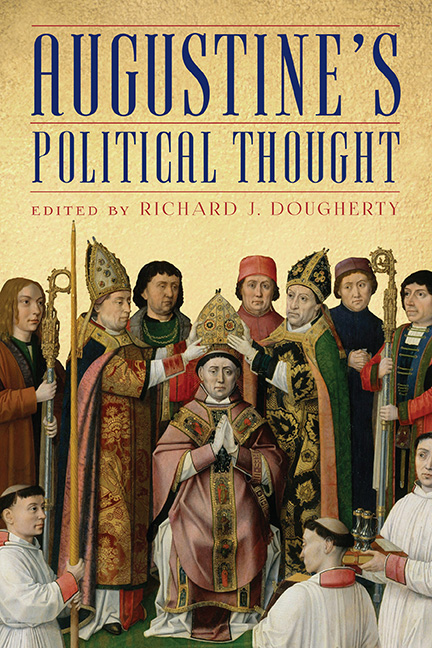Book contents
- Frontmatter
- Contents
- Acknowledgments
- Introduction
- Part 1 Politics, Nature, and Virtue
- 1 St. Augustine and the Problem of Political Ethics in The City of God
- 2 The Other Happy Life: The Political Dimensions to St. Augustine's Cassiciacum Dialogues
- 3 Peace in the Order of Nature: Augustine, Giles, and Dante
- 4 Deeds and Words: Latreia, Justice, and Mercy in Augustine's Political Thought
- 5 The Investigation of Justice in Augustine's Confessions
- Part 2 St. Augustine and Ancient Political Philosophy
- Notes on Contributors
- Index
3 - Peace in the Order of Nature: Augustine, Giles, and Dante
from Part 1 - Politics, Nature, and Virtue
Published online by Cambridge University Press: 26 June 2019
- Frontmatter
- Contents
- Acknowledgments
- Introduction
- Part 1 Politics, Nature, and Virtue
- 1 St. Augustine and the Problem of Political Ethics in The City of God
- 2 The Other Happy Life: The Political Dimensions to St. Augustine's Cassiciacum Dialogues
- 3 Peace in the Order of Nature: Augustine, Giles, and Dante
- 4 Deeds and Words: Latreia, Justice, and Mercy in Augustine's Political Thought
- 5 The Investigation of Justice in Augustine's Confessions
- Part 2 St. Augustine and Ancient Political Philosophy
- Notes on Contributors
- Index
Summary
Nine hundred years after Augustine, in the region of the West that still called itself the Roman Empire, fellow citizens and fellow Christians quarreled as partisans of two rival powers, the emperor and the pope. Each of these powers had its own intellectual defenders. Among those arguing for papal supremacy, perhaps the most important was Giles of Rome, bishop of Bourges and author of the treatise On Ecclesiastical Power. For the other side, Dante Alighieri wrote Monarchy to defend the right of the emperor to establish universal peace in the world.
In their very opposition, Giles and Dante are both attempting to answer the question of the best regime. That, of course, is something that political philosophers had been trying to do since classical antiquity. Not even the dispute over papal supremacy is wholly new, for Aristotle himself had given priests a certain role in his teaching on the best regime (Politics 1329a27–34). What sets Dante and Giles apart from classical political philosophy is the idea that rulers ought to rule for the sake of peace rather than for the cultivation and exercise of virtue. That claim goes beyond the teaching of Aristotle; its source is rather Augustine. In book 19 of The City of God, Augustine declares peace to be the natural aim of all human beings, and he describes peace as existing in various forms throughout the order of nature. Giles and Dante both retain this aspect of Augustine's teaching; in that respect, they agree with one another. Where they disagree is on which power, the spiritual or the temporal, is ultimately responsible for defending the peace.
One naturally wonders what Augustine thought of the latter issue. The answer is far from obvious, however, for book 19 contains statements with very different implications about who should rule; some passages seem to anticipate Giles's side of the argument, but others call Dante to mind. It is unclear, indeed, whether the question that exercised Augustine's successors was especially important to Augustine himself, for the very terms “temporal power” and “spiritual power” are absent from The City of God. But if Augustine is neither defending nor subverting certain political institutions—if he is not offering his own answer to the best regime—what is he doing?
- Type
- Chapter
- Information
- Augustine's Political Thought , pp. 53 - 73Publisher: Boydell & BrewerPrint publication year: 2019

